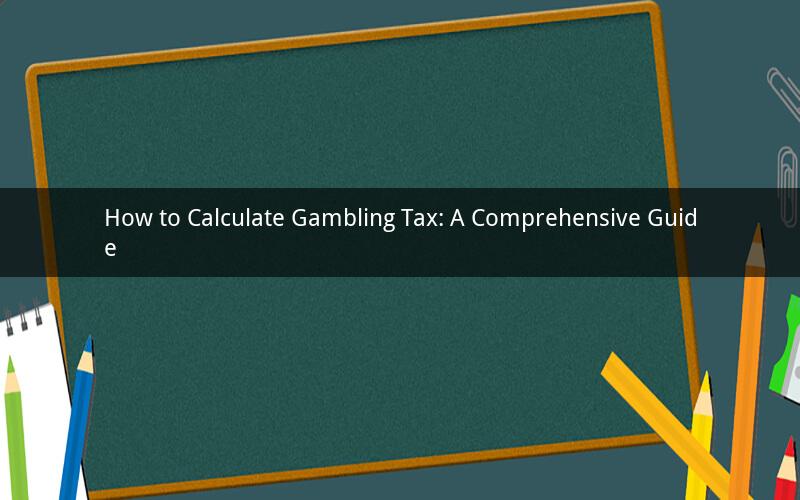
Introduction:
Gambling tax is an important aspect of the gambling industry that both players and operators should be aware of. Calculating gambling tax can be a complex task, but with the right knowledge and tools, it can be done efficiently. In this guide, we will explore the different aspects of gambling tax calculation, including the types of gambling, tax rates, and the necessary steps to calculate and pay the tax. Whether you are a player or an operator, understanding how to calculate gambling tax is crucial for compliance and financial management.
Types of Gambling and Tax Rates:
1. Lottery and Raffle Taxes:
Lottery and raffle taxes vary depending on the jurisdiction. In some countries, a fixed percentage of the lottery revenue is taxed, while in others, the tax rate is based on the prize amount. To calculate the tax, you need to determine the tax rate applicable to your specific situation and apply it to the lottery or raffle revenue.
2. Betting Taxes:
Betting taxes can be calculated in different ways, depending on the type of betting involved. For sports betting, the tax rate is usually a percentage of the betting turnover. For casino games, the tax rate may be a percentage of the gross gaming revenue or a fixed tax per bet. It is important to consult the tax regulations in your jurisdiction to determine the applicable tax rate.
3. Poker Taxes:
Poker taxes can be calculated based on the rake or the percentage of the pot. The tax rate may vary depending on the type of poker game and the jurisdiction. It is crucial to understand the specific tax regulations in your area to accurately calculate the poker tax.
Steps to Calculate Gambling Tax:
1. Determine the Taxable Amount:
Identify the revenue or prize amount that is subject to gambling tax. This may include lottery revenue, betting turnover, or poker rake. Make sure to consider any deductions or exemptions that may apply in your jurisdiction.
2. Calculate the Tax Rate:
Research the tax regulations in your jurisdiction to determine the applicable tax rate for the type of gambling you are involved in. This rate may be a percentage of the taxable amount or a fixed amount per bet.
3. Apply the Tax Rate:
Multiply the taxable amount by the tax rate to calculate the tax liability. For example, if you have a betting turnover of $10,000 and the tax rate is 10%, your tax liability would be $1,000.
4. Keep Detailed Records:
Maintain accurate and organized records of all gambling transactions, including revenue, expenses, and tax calculations. This will help you comply with tax regulations and make it easier to prepare tax returns.
5. Pay the Tax:
Once you have calculated the tax liability, ensure that you pay it to the appropriate tax authority. Failure to pay gambling tax can result in penalties and legal consequences.
Frequently Asked Questions:
1. Question: Can I deduct expenses related to gambling when calculating gambling tax?
Answer: Yes, in some jurisdictions, certain expenses related to gambling, such as travel costs or equipment, may be deductible. However, it is important to consult the tax regulations in your specific jurisdiction to determine which expenses are eligible for deduction.
2. Question: Is there a minimum tax amount that needs to be paid?
Answer: Yes, in some jurisdictions, there may be a minimum tax amount that needs to be paid even if the taxable amount is low. This minimum tax amount is usually based on a fixed rate or a percentage of the taxable amount.
3. Question: Can I pay gambling tax quarterly or annually?
Answer: The frequency of tax payments depends on the tax regulations in your jurisdiction. Some jurisdictions require quarterly tax payments, while others allow annual payments. It is important to comply with the specific tax requirements in your area.
4. Question: What happens if I fail to pay gambling tax?
Answer: Failing to pay gambling tax can result in penalties and legal consequences. It is crucial to comply with tax regulations and pay the tax on time to avoid any legal issues.
5. Question: Can I hire a tax professional to help me calculate gambling tax?
Answer: Yes, hiring a tax professional can be beneficial, especially if you are unsure about the tax regulations or if your gambling activities are complex. A tax professional can provide expert advice and ensure accurate calculations and compliance with tax laws.
Conclusion:
Calculating gambling tax can be a challenging task, but with the right knowledge and tools, it can be done efficiently. By understanding the types of gambling, tax rates, and the necessary steps to calculate and pay the tax, both players and operators can ensure compliance and effective financial management. Always consult the tax regulations in your jurisdiction and consider seeking professional advice if needed.